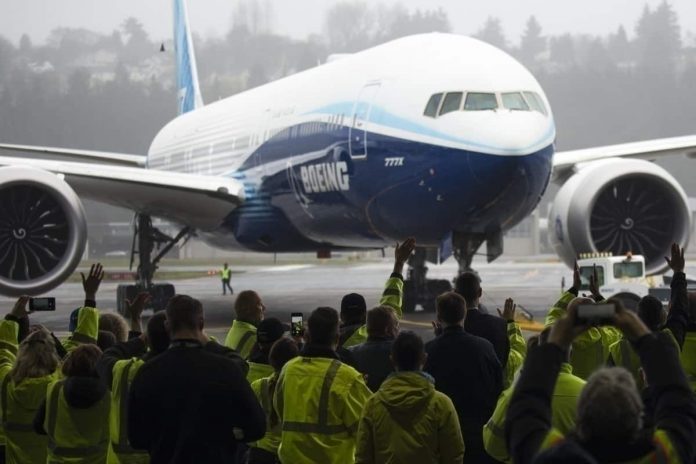Boeing’s fourth 777X took to the skies for the first time on Sunday. The 777-9 made a successful maiden flight over Washington state. The plane now joins her three 777X stablemates outside Seattle while cabin systems and extended operations get thoroughly run through before the aircraft type begins flying paying passengers in 2022.

Boeing has high hopes for this plane
The first 777X only took to the air in January. After delays, Chief Test Pilot Van Chaney took the first 777-9 up for four hours on January 25. The second aircraft first flew in late April, and the third 777-9 completed its first test flight in August.
Boeing has high hopes for the plane. Back in January, at the time of the 777X first flight, Boeing’s Director of Marketing, Wendy Sowers, called the 777X called the aircraft type a marque plane.
“This airplane, for me, is the flagship of the big airlines around the world,” she said.
It was a bold claim for an aircraft that’s had a troubled gestation. As Boeing phases out its iconic 747 type, the manufacturer hopes the 777X will take its place. While the 777X lacks the eye-catching lines of the 747, it’s lighter, more fuel-efficient, and can carry almost as many passengers.
All together now. Today our fourth flight test 777-9 joined the rest of the #777X fleet at Seattle’s Boeing Field after a safe, successful first flight. WH004 will test cabin systems, extended operations and more as part of our robust test program. pic.twitter.com/9GGpXvbB6M
— Boeing Airplanes (@BoeingAirplanes) September 21, 2020
The 777X beset with engine design issues and delays
The 777X program launched back in late 2013. It’s taken seven years to get four test aircraft into the air. The 777-9s are big planes with big engines that push the boundaries of engine design and engineering. It’s these ambitious engines that have caused many of the 777X delays at Boeing.
Under each wing is a General Electric GE9X engine. Each engine is as wide as a Boeing 737’s fuselage. Each engine punches out 105,000 pounds of thrust. The engines also claim to be 10% more fuel-efficient than the previous GE90 version.
Design issues with the GE9X engines have beset Boeing. In 2013, Boeing wanted to start delivering the 777X in 2020. That has now blown out to 2022.
Boeing has 309 orders (and a further 300 options) for the 777X. When the aircraft launched in 2013, it already had 259 orders. Emirates remains the biggest customer so far, on Boeing’s books to take 115 of the planes.

Is the 777X the right aircraft for the times?
But the world has changed a lot since 2013. The eight airlines that have ordered the 777X are all legacy airlines with substantial long-haul operations. Some experts ask whether the 777X is coming on too late for the times, like the A380.
There’s a clear trend towards smaller planes with big capabilities. Boeing’s 787 Dreamliner is a good example; an agile, mid-size, fuel-efficient aircraft that can fly long distances. Across the Atlantic, the Airbus A350 also fits into this category.
Some people say the 777X is too big for what airlines want in 2020. That’s why the orders have stalled, and no-one, other than Boeing, is worried too much about delays.
The events of 2020 will further drive airlines towards smaller planes as they seek to drive down costs and accommodate changing passenger demand.
But Boeing has too much invested in the 777X to pull out now. It may not be the perfect airline for the times, but Boeing will get it delivered, better late than never.
[ad_2]
Source link

